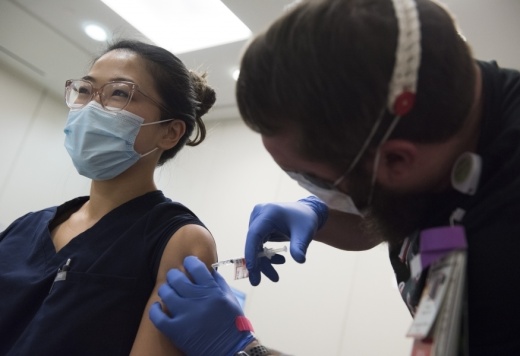Much like the initial vaccinate rollout that began in late 2020, the federal Food and Drug Administration and the Centers for Disease Control and Prevention have taken a phased approach to making booster shots available. Like in cities throughout the United States, some Austin residents are already eligible to get boosters, while others have not yet been recommended to do so.
When and why are boosters recommended?
The FDA consulted research from Pfizer’s clinical trials as well as real-world data from vaccine administration in the U.S. and other countries, indicating that the Pfizer vaccine’s efficacy dips somewhat around six months after a patient’s initial two-dose vaccine series. A third dose administered between six and eight months after the second dose can boost immunity back to peak levels, according to the FDA.
Who is eligible for a booster shot?
The FDA first issued an emergency use authorization for a third dose of the Pfizer vaccine Aug. 12, but only for certain immunocompromised individuals. People in treatment for tumors and blood cancers, people taking immunosuppressant drugs following organ transplants, people who have advanced or untreated HIV, people with immunocompromising medical disorders, people with certain chronic medical conditions and dialysis patients were included in the first group authorized for boosters.
On Sept. 12, the FDA voted not to authorize the booster yet for everyone ages 16 and up, in line with the World Health Organization’s recommendation to hold off on boosters until more of the world has received access to their first doses. However, the FDA did expand the emergency use authorization to include people over the age of 65 and people over the age of 16 who have high-risk medical conditions or work in high-risk environments, such as hospitals.
Are boosters available for the Moderna and Johnson & Johnson vaccines?
The FDA has not yet issued recommendations for Moderna or Johnson & Johnson boosters.
However, Johnson & Johnson announced in late August data supporting the administration of an additional Johnson & Johnson dose eight months after the first dose is administered.
“We have established that a single shot of our COVID-19 vaccine generates strong and robust immune responses that are durable and persistent through eight months. With these new data, we also see that a booster dose of the Johnson & Johnson COVID-19 vaccine further increases antibody responses among study participants who had previously received our vaccine,” said Mathai Mammen, who heads up vaccine research for Johnson & Johnson.
Moderna announced Sept. 1 that it had also submitted data to the FDA for a booster shot representatives said shows “robust antibody responses against the delta variant.”
For now, people who have received Moderna or Johnson & Johnson doses are asked by the FDA not to “mix and match” by seeking out a Pfizer booster since there is limited data available on the effects of mixing doses.
Where are booster shots available in Austin?
On Sept. 28, Austin Public Health Director Adrienne Sturrup fielded COVID-19 booster shots in a presentation to Austin City Council and the Travis County Commissioners Court. She said APH is ready to expand vaccine outreach to include the widespread offering of boosters once the FDA authorizes Pfizer’s vaccine booster for all adults—but noted that most residents who got their shots from APH received a different vaccine.
“As a community, we were mostly Moderna. Out of the 460-some-thousand shots [APH administered], only 5,841 of those are Pfizer,” Sturrup said.
Currently, eligible individuals can receive a third Pfizer dose at any APH vaccine clinic. They can also seek them out at pharmacies and health care providers around Austin.





